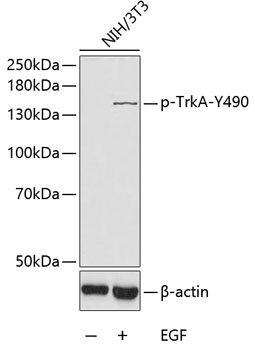Anti-Phospho-TrkA-Y490 Antibody (CABP0492)
- SKU:
- CABP0492
- Product type:
- Antibody
- Reactivity:
- Human
- Reactivity:
- Mouse
- Host Species:
- Rabbit
- Isotype:
- IgG
- Antibody Type:
- Polyclonal Antibody
- Research Area:
- Developmental Biology
Description
| 抗体名: | Anti-Phospho-TrkA-Y490 Antibody |
| 抗体コード: | CABP0492 |
| 抗体サイズ: | 20uL, 50uL, 100uL |
| 申し込み: | WB |
| 反応性: | Human, Mouse |
| 宿主種: | Rabbit |
| 免疫原: | A phospho specific peptide corresponding to residues surrounding Y490 of human TrkA |
| 申し込み: | WB |
| 推奨希釈: | WB 1:500 - 1:2000 |
| 反応性: | Human, Mouse |
| ポジティブサンプル: | NIH/3T3 |
| 免疫原: | A phospho specific peptide corresponding to residues surrounding Y490 of human TrkA |
| 精製方法: | Affinity purification |
| ストレージバッファ: | Store at -20°C. Avoid freeze / thaw cycles. Buffer: PBS with 0.02% sodium azide, 50% glycerol, pH7.3. |
| アイソタイプ: | IgG |
| 順序: | Email for sequence |
| 遺伝子ID: | 4914 |
| Uniprot: | P04629 |
| セルラーロケーション: | Cell membrane, Early endosome membrane, Late endosome membrane, Single-pass type I membrane protein |
| 計算された分子量: | 77kDa/83kDa/86kDa/87kDa |
| 観察された分子量: | 150kDa |
| 同義語: | NTRK1, MTC, TRK, TRK1, TRKA, Trk-A, p140-TrkA |
| バックグラウンド: | This gene encodes a member of the neurotrophic tyrosine kinase receptor (NTKR) family. This kinase is a membrane-bound receptor that, upon neurotrophin binding, phosphorylates itself and members of the MAPK pathway. The presence of this kinase leads to cell differentiation and may play a role in specifying sensory neuron subtypes. Mutations in this gene have been associated with congenital insensitivity to pain, anhidrosis, self-mutilating behavior, mental retardation and cancer. Alternate transcriptional splice variants of this gene have been found, but only three have been characterized to date. |
| UniProt Protein Function: | TrkA: a receptor tyrosine kinase of the Trk family. High affinity receptor for nerve growth factor, neurotrophin-3 and neurotrophin-4/5 but not brain- derived neurotrophic factor. Known substrates include Shc, PI-3K, and PLC-gamma-1. Has a crucial role in the development and function of the nociceptive reception system. Two splice variant isoforms have been described. |
| UniProt Protein Details: | Protein type:Protein kinase, TK; Oncoprotein; EC 2.7.10.1; Membrane protein, integral; Protein kinase, tyrosine (receptor); Kinase, protein; TK group; Trk family Chromosomal Location of Human Ortholog: 1q21-q22 Cellular Component: protein complex; cell surface; integral to plasma membrane; late endosome membrane; dendrite; early endosome; cell soma; early endosome membrane; axon; late endosome; plasma membrane; cytoplasmic vesicle; receptor complex; endosome Molecular Function:neurotrophin p75 receptor binding; neurotrophin binding; protein binding; nerve growth factor receptor activity; protein homodimerization activity; ephrin receptor binding; nerve growth factor binding; transmembrane receptor protein tyrosine kinase activity; ATP binding Biological Process: circadian rhythm; axon guidance; mechanoreceptor differentiation; peptidyl-tyrosine phosphorylation; activation of MAPKK activity; nerve growth factor receptor signaling pathway; protein amino acid autophosphorylation; positive regulation of synaptic transmission, glutamatergic; protein amino acid phosphorylation; olfactory nerve development; activation of NF-kappaB transcription factor; negative regulation of cell proliferation; sympathetic nervous system development; response to radiation; learning and/or memory; small GTPase mediated signal transduction; response to axon injury; negative regulation of neuron apoptosis; response to electrical stimulus; detection of temperature stimulus involved in sensory perception of pain; response to hydrostatic pressure; aging; response to drug; response to nutrient levels; phosphoinositide-mediated signaling; adenylate cyclase activation; Sertoli cell development; detection of mechanical stimulus involved in sensory perception of pain; positive regulation of programmed cell death; positive regulation of angiogenesis; response to ethanol; phospholipase C activation; B cell differentiation; Ras protein signal transduction; response to activity; positive regulation of Ras protein signal transduction; transmembrane receptor protein tyrosine kinase signaling pathway Disease: Thyroid Carcinoma, Familial Medullary; Insensitivity To Pain, Congenital, With Anhidrosis |
| NCBI Summary: | This gene encodes a member of the neurotrophic tyrosine kinase receptor (NTKR) family. This kinase is a membrane-bound receptor that, upon neurotrophin binding, phosphorylates itself and members of the MAPK pathway. The presence of this kinase leads to cell differentiation and may play a role in specifying sensory neuron subtypes. Mutations in this gene have been associated with congenital insensitivity to pain, anhidrosis, self-mutilating behavior, cognitive disability and cancer. Alternate transcriptional splice variants of this gene have been found, but only three have been characterized to date. [provided by RefSeq, Jul 2008] |
| UniProt Code: | P04629 |
| NCBI GenInfo Identifier: | 4585712 |
| NCBI Gene ID: | 4914 |
| NCBI Accession: | NP_002520 |
| UniProt Related Accession: | P04629 |
| Molecular Weight: | 87.511 |
| NCBI Full Name: | high affinity nerve growth factor receptor isoform 2 |
| NCBI Synonym Full Names: | neurotrophic receptor tyrosine kinase 1 |
| NCBI Official Symbol: | NTRK1 |
| NCBI Official Synonym Symbols: | MTC; TRK; TRK1; TRKA; Trk-A; p140-TrkA |
| NCBI Protein Information: | high affinity nerve growth factor receptor |
| UniProt Protein Name: | High affinity nerve growth factor receptor |
| UniProt Synonym Protein Names: | Neurotrophic tyrosine kinase receptor type 1; TRK1-transforming tyrosine kinase protein; Tropomyosin-related kinase A; Tyrosine kinase receptor; Tyrosine kinase receptor A; Trk-A; gp140trk; p140-TrkA |
| Protein Family: | Trk system potassium uptake protein |
| UniProt Gene Name: | NTRK1 |
| UniProt Entry Name: | NTRK1_HUMAN |


